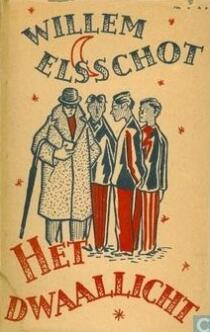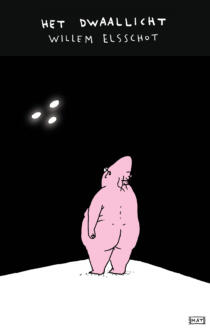On Sunday, 22 December, we find ourselves on the first floor of an apartment building on the Schilderskade in Amsterdam. It is inhabited by the Van Egters family, which consists of a bookworm father, a grumpy and clumsy mother and their twenty-three-year-old son Frits, who is an office clerk. Frits is constantly annoyed by his parents’ poor table manners and is obsessed with death. He fears that he will not make it to the last day of the year because everywhere he looks, he sees signs of decay.
Hair loss is the main one. With every encounter with his married brother or his friends, their progressive baldness - real or imagined – is discussed. He drives everyone mad with his gruesome anecdotes. He is bitingly sharp and varies in his speech – much to the amusement of others - from pompous to solemn. His head is constantly filled with obscene stories, scathing judgements and short, despairing prayers.
On Monday, 23 December, he accompanies Joop to a reunion at Berends High School, from which he failed to graduate. He hopes to outdo his graduate friends with his absurd horror stories.
The next few days follow the same monotonous course. The closer the end of the year comes, the greater his fear of death grows. Detailed descriptions of boredom, scarcity and decay suggest that Frits longs for beauty, but it is nowhere to be found since the war. He transforms the slightest flaw into impending doom.
The Van Egters do not celebrate Christmas. Not even New Year’s Eve. Despite this, Mother has bought a bottle of wine. At least, that’s what she thinks. In fact, it is a bottle of berry cordial. They wish each other a happy new year at midnight, drink a glass of berry cordial and go to bed. It could not be more depressing. In the bathroom, Frits is suddenly overcome by a sense of euphoria.
‘I’m alive’ he whispered, ‘I’m breathing. And I’m moving. I’m breathing, I’m moving, so I’m alive. What can possibly happen now?’ Relieved, he filled his lungs with air and crept under the blanket. ‘It’s over,’ he whispered, ‘it’s done. The year has gone by.’ […] 'It was seen, it did not go by unnoticed.’ And then he fell into a deep sleep.
The Evenings shocked the literary world of the time because the novel made it palpable that the exalted values from before the war had turned out to be worthless. They had made way for an illusionless, dull, mundane routine of survival that forced young and old to have “small lives”: read a book or the newspaper, listen to the radio, talk with friends, smoke cigarettes, go to the cinema. There was no room for grandeur or adventure. Everything was rationed: coal, food, tobacco, electricity. Everything except nightmares: Frits had those every night.
What makes this book anything but dull and irritating is how it manages to combine cynical dialogue, an obsession with illness and decay and razor-sharp observations of countless trivialities to huge comic effect.
The novel continues to inspire many young writers to this day, whether through the content or the style. With The Evenings, Reve created a school of writing that exists to this day.






